Santa Maria Ship & Museum
The Santa Maria Ship & Museum was a museum ship in downtown Columbus, Ohio. The craft was a full-size replica of the Santa María, one of three ships Christopher Columbus used in his first voyage to the Americas. The ship was displayed in Columbus from 1991 to 2014, when it had to be relocated due to the Scioto Mile project reshaping the riverbanks. The Santa Maria has sat on a city-owned lot since then.
Attributes
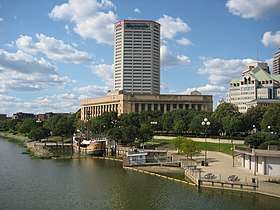
The wooden craft was a full-size replica of Christopher Columbus's Santa María, one of three ships he used in his first voyage to the Americas. The ship was believed to be the most accurate replica of the original ship. The ship, described by its builders as a "15th century caravel", had three masts and spanned 98 ft (30 m).[1][2] The replica was displayed on the Scioto River, moored to Battelle Riverfront Park.
History
The Santa Maria was commissioned in the late 1980s as a permanent riverfront attraction, in anticipation of the 1992 Christopher Columbus Quincentennial Jubilee (celebrating the 500th anniversary of Columbus's first voyage). It was built using $2 million in private funds at Scarano Boat Building in Albany, New York. It was halved and trucked into the city in 1991, reassembled in the parking lot of the Franklin County Veterans Memorial, and moved to Battelle Riverfront Park.[1] The ship was dedicated October 11, 1991 (the Friday before Columbus Day), in time for the 1992 celebration. The event was met with about 150 protesters, including many Native Americans, both at nearby Bicentennial Park and in front of the ship.[3]
The ship's presence was aimed to draw people to the Columbus riverfront, and drew numerous city school trips, though it overall had limited success, and attendance dropped over the years.[4] The nonprofit tourist organization that operated it closed in 2011, and the Columbus Recreation and Parks Department inherited it. Around 2014, due to the Scioto Mile project, as well as $5-6 million in necessary repairs, the Santa Maria was taken apart into pieces and moved onto a city-owned lot beside a wastewater treatment plant in Columbus's South Side, in ten pieces. Santa Maria Inc. raised money for repairs, and it was estimated that the ship could return to the riverfront. Environmental Protection Agency rules no longer permit it back on the Scioto River, and nobody has recently expressed interest in restoring the ship given the expense.[5][6][7]
Gallery
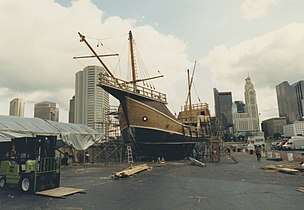 Reassembly in 1991
Reassembly in 1991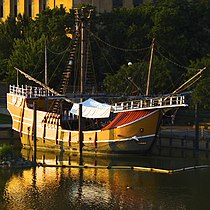 Starboard side
Starboard side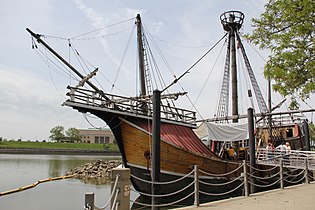 Bow
Bow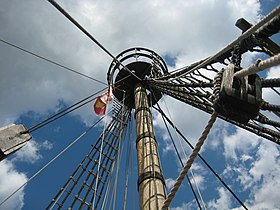 Crow's nest and rigging
Crow's nest and rigging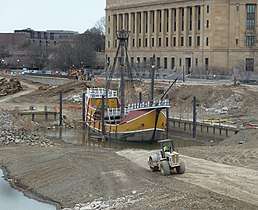 Scioto Mile construction around the ship, March 2014
Scioto Mile construction around the ship, March 2014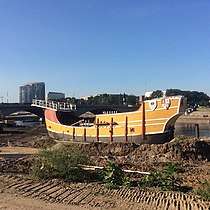 Demasted and removed from the river, August 2014
Demasted and removed from the river, August 2014
See also
References
- Clark, John (October 6, 2019). "Columbus Uncovered: Fascinating, Real-Life Stories About Unusual People, Places & Things in Ohio's Capital City". Gatekeeper Press – via Google Books.
- "Santa Maria". Scaranoboat.com.
- Carmen, Barbara. "DEMONSTRATORS CURSE COLUMBUS AS 'MURDERER'." Columbus Dispatch, 13 Oct. 1992, p. 03E. infoweb.newsbank.com/apps/news/document-view?p=WORLDNEWS&docref=news/10E0D4C7145805E8. Accessed 26 June 2020.
- "Scioto Mile: City banks on river in waterfront makeover". The Columbus Dispatch. July 7, 2011. Retrieved April 23, 2020.
- "City Quotient: Where's the Santa Maria, and When Is It Coming Back?". Columbus Monthly.
- Gray, Kathy Lynn. "Who wants the Santa Maria?". Columbus Monthly.
- Abdurraqib, Hanif. "The Vanishing Monuments of Columbus, Ohio". The New Yorker.
External links
| Wikimedia Commons has media related to Santa Maria (ship, 1991). |
- Official website, 2015 archive by the Internet Archive
- Information from the shipbuilder